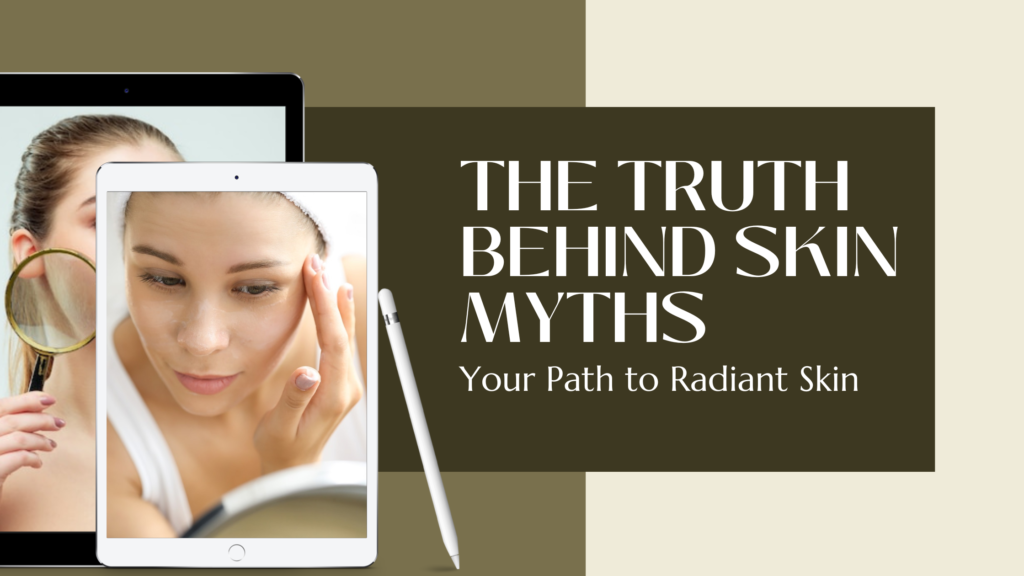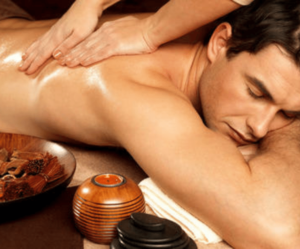
Achieving radiant, flawless skin is a goal for many, and with an abundance of skincare advice available, it’s easy to fall for popular myths and misconceptions. In this blog post, we will debunk common skin myths and provide expert tips to help you on your journey to glowing skin.
Your skin is the largest organ in your body and plays a crucial role in protecting you from external elements, regulating temperature, and maintaining moisture. Understanding your skin type is essential for developing a proper skincare routine that suits your specific needs. Normal skin, dry skin, oily skin, combination skin, and sensitive skin are the five primary categories. Identifying your skin type will help you choose the right products and treatments that can address any concerns you might have. For instance, if you have oily skin, you might benefit from oil-free moisturisers and products containing ingredients like salicylic acid to control excess sebum production. On the other hand, if your skin is dry, you’ll want to focus on hydrating products with ingredients like hyaluronic acid.
The role of dermatologists:
Dermatologists play a crucial role in maintaining healthy skin and diagnosing and treating various skin conditions. As skincare and appearance become increasingly important in today’s society, the demand for dermatologists has grown significantly.
One of the primary responsibilities of dermatologists is to diagnose various skin conditions. From common issues like acne, eczema, and psoriasis to more severe diseases like skin cancer, dermatologists use their expertise to identify and understand the underlying causes of these conditions. They perform thorough examinations, use advanced tools, and rely on their knowledge to offer accurate diagnoses.
After identifying a skin condition, dermatologists create personalised treatment plans for their patients. Because every person’s skin is different, what works for one person might not be appropriate for another. Dermatologists consider factors such as skin type, medical history, lifestyle, and preferences to develop effective and tailored treatment approaches. These plans may include topical medications, oral medications, lifestyle modifications, or even surgical procedures when necessary.
Debunking common skin myths:
1. Myth: Tanning beds are safer than natural sunlight.
Fact: Tanning beds emit harmful UV rays that can increase the risk of skin cancer and premature aging. Opt for self-tanners or bronzers for a safer glow.
2. Myth: Pores Can Be Shrunk
One prevailing myth is that pores can be shrunk or enlarged. In reality, pore size is genetically determined and cannot be permanently changed. However, using gentle exfoliation and maintaining a clean skincare routine can help minimise their appearance.
3. Myth: Oily Skin Doesn’t Need Moisturiser
Contrary to popular belief, even oily skin requires proper moisturization. Using a lightweight, oil-free moisturiser helps maintain the skin’s balance and prevent excessive oil production.
4. Myth: Expensive products are always better
Pricey skincare products don’t always equate to better results. The effectiveness of a product depends on its ingredients and how they suit your skin type. Sometimes, affordable products can be just as effective as luxury ones.
5. Myth: You Don’t Need Sunscreen on Cloudy Days
Sunscreen is a must, regardless of the weather. The skin can be harmed by harmful UV radiation that can get through clouds. Always wear broad-spectrum sunscreen to protect your skin from the sun’s harmful effects.
6. Myth: Skincare Treatments Work Overnight
Be wary of products or treatments that promise overnight results. Achieving radiant skin takes time and consistent care. Patience is key to seeing long-term improvements.
7. Myth: Chocolate Causes Acne
Is your love for chocolate holding you back from indulging? Fear not! The belief that chocolate causes acne is a common misconception. The truth is, there is no direct link between chocolate consumption and acne breakouts. Acne is primarily caused by factors like hormones and genetics, not your favorite treat. However, it’s essential to maintain a balanced diet to promote overall skin health.
8. Myth: Sleeping with makeup is fine
We’ve all been guilty of crashing into bed without removing makeup after a long day. However, leaving makeup on overnight can clog pores and lead to breakouts and dull skin. Make it a habit to cleanse your face before bedtime, allowing your skin to breathe and rejuvenate while you sleep.
9. Myth: Scrubbing your face makes it healthier
Scrubbing your face vigorously might feel like you’re exfoliating away impurities, but it can do more harm than good. Harsh scrubbing can irritate the skin, leading to redness and sensitivity. Instead, opt for gentle exfoliants with fine particles and use them no more than 2-3 times a week to maintain a healthy glow.
10. Myth: Drinking More Water Cures All Skin Issues
Hydration is vital for healthy skin, but simply chugging water won’t magically erase all skin issues. Drinking enough water helps maintain the skin’s moisture balance, but it won’t cure acne or other skin conditions. A holistic approach, including a balanced diet and proper skincare, is necessary for achieving radiant skin.
11. Myth: Substituting sunscreen with makeup is enough
Many makeup products boast SPF protection, leading people to believe they can skip sunscreen. While some makeup products contain SPF, they often don’t provide adequate protection. It’s essential to apply a dedicated sunscreen before makeup to fully shield your skin from harmful UV rays.
12. Myth: Skincare is only important for women
The myth that skincare is only important for women is nothing but a misconception that should be discarded. Skincare is a crucial aspect of self-care and overall health, applicable to people of all genders. Embracing skincare is not only about looking good; it’s about feeling confident, promoting inclusivity, and nurturing healthy skin. So, let’s bid farewell to this outdated myth and welcome a skincare routine that knows no boundaries.
13. Myth: All moles are cancerous
Most moles are harmless and require no medical intervention. However, it is essential to be aware of the characteristics of potentially harmful moles and seek professional evaluation if any concerning changes occur. Regular self-examinations and professional skin checks can help detect skin cancer early, improving the chances of successful treatment. Remember, not all moles are dangerous, but vigilance and knowledge are key to maintaining healthy skin.
14. Myth: All rashes are contagious
All rashes are contagious, which is far from the truth. Rashes can be caused by various factors, and their contagiousness depends on the underlying cause. It is crucial to differentiate between contagious and non-contagious rashes to take appropriate precautions and seek the right treatment. If you have a rash or are concerned about one, don’t hesitate to seek medical advice from a qualified healthcare professional.
15. Myth: Prolonged Showers Improve Hydration
Hydration relies on the internal absorption of fluids through the digestive system rather than external application through the skin. While showers are enjoyable and part of personal hygiene, they are not a substitute for proper fluid intake. To stay properly hydrated, it’s essential to prioritise drinking water and other hydrating beverages throughout the day.
Expert Tips for Glowing Skin
• Follow a consistent skincare routine.
Make sure to incorporate cleaning, toning, moisturising, and UV protection into your regular skincare regimen. Consistency is vital for maintaining healthy skin.
• Stay hydrated.
Drinking enough water throughout the day is crucial for skin hydration. Hydrated skin has a supple, luminous, and young appearance.
• Eat a balanced diet
A well-balanced diet rich in vitamins, minerals, and antioxidants promotes healthy skin from within. Your meals should contain fruits, vegetables, and whole grains.
• Get enough sleep.
Your skin can heal and regenerate itself with enough sleep. Every night, get 7-9 hours of restful sleep.
• Manage stress
Chronic stress can cause skin problems, including dullness and acne. Engage in stress-reducing activities like meditation or yoga to maintain clear and radiant skin.
Conclusion:
Understanding the truth behind common skin myths is essential to achieving radiant and healthy skin. Considering that every person has a unique type of skin, what works for one person may not work for another. Stick to a consistent skincare routine, follow expert tips, and be patient in your journey towards glowing skin. Embrace your natural beauty, and your skin will thank you with a radiant, flawless complexion.
With years of experience and a passion for dermatology, Dr. Priya Diwaker is not just a dermatologist; she’s your skin’s best friend. With a deep understanding of the latest advancements in dermatology, she ensures that you receive the most effective and personalised care possible at Medigenix Clinic. Her commitment to excellence in skincare and her dedication to staying at the forefront of dermatological advancements make her the go-to expert in Raipur.
FAQs (Frequently Asked Questions)
Q1: Can makeup cause skin problems?
Yes, certain makeup products can clog pores and cause breakouts. Look for non-comedogenic and oil-free makeup options.
Q2: Can a healthy diet improve skin appearance?
=> Absolutely! A balanced diet with essential nutrients positively impacts skin health and appearance.
Q3: How often should I exfoliate my skin?
Exfoliate 2-3 times a week using a gentle exfoliant to remove dead skin cells and reveal a brighter complexion.
Q4: Can eating chocolate cause acne?
Eating chocolate does not directly cause acne. Acne is influenced by factors like hormones and genetics.
Q5: Is tanning good for the skin?
No, tanning is not good for the skin. It can lead to premature ageing, wrinkles, and skin cancer due to UV exposure.
Q6: Do I need sunscreen on cloudy days?
Yes, you need sunscreen on cloudy days, as harmful UV rays can still penetrate and damage your skin.
Q7: Does popping pimples help?
Popping pimples can worsen the condition, causing inflammation and scarring. It’s best to avoid it.
Q8: Should I moisturise if I have oily skin?
Yes, moisturising is essential for all skin types, including oily skin, to keep it balanced and hydrated.
Q9: Is it necessary to wear sunscreen indoors?
Choosing the right sunscreen is essential. The best sunscreen is a broad-spectrum product with an SPF of 30 or higher. Apply it generously on your face, neck, and any exposed skin 15 minutes before going indoors. Reapply every two hours, especially if you’re working near windows or exposed to artificial lighting for prolonged periods.
Q10: Can stress really cause skin problems?
It’s essential to recognise the impact of stress on your skin’s health. To maintain healthy skin, consider adopting stress-management techniques such as regular exercise, mindfulness practices, getting enough sleep, and seeking support from friends, family, or professionals when needed. Remember, a balanced lifestyle and managing stress can contribute to healthier, glowing skin.
Q11: Is acne only a teenage problem?
Acne is not exclusive to teenagers; it can affect individuals of all ages due to various factors like hormones, diet, and genetics. Understanding the underlying causes and adopting appropriate skincare and lifestyle changes can help manage and prevent acne breakouts effectively. If you or someone you know is struggling with acne, it’s essential to consult a dermatologist for personalised advice and treatment options. Remember, addressing acne early can lead to clearer and healthier skin, regardless of age!






